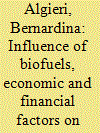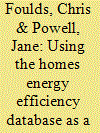| Srl | Item |
| 1 |
ID:
132657


|
|
|
|
|
| Publication |
2014.
|
| Summary/Abstract |
Biofuels production has experienced rapid growth worldwide as one of the several strategies to promote green energy economies. Indeed, climate change mitigation and energy security have been frequent rationales behind biofuel policies, but biofuels production could generate negative impacts, such as additional demand for feedstocks, and therefore for land on which to grow them, with a consequent increase in food commodity prices. In this context, this paper examines the effect of biofuels and other economic and financial factors on daily returns of a group of commodity futures prices using Generalized Autoregressive Conditional Heteroskedasticity (GARCH) family models in univariate and multivariate settings. The results show that a complex of drivers are relevant in explaining commodity futures returns; more precisely, the Standard and Poor×s (S&P) 500 positively affects commodity markets, while the US/Euro exchange rate brings about a decline in commodity returns. It turns out, in addition, that energy market returns are significant in explaining commodity returns on a daily basis, while monetary liquidity is not. This would imply that biofuel policy should be carefully monitored in order to avoid excessive first-generation subsidization, which would trigger a fuel vs. food conflict.
|
|
|
|
|
|
|
|
|
|
|
|
|
|
|
|
| 2 |
ID:
132642


|
|
|
|
|
| Publication |
2014.
|
| Summary/Abstract |
In devising viable energy efficiency policies that can reduce the greenhouse gas emissions of existing dwellings (e.g. UK×s Green Deal), data are required on current insulation levels and its influences. One such data source is the seldom used UK Energy Saving Trust×s Homes Energy Efficiency Database (HEED), which this paper investigates using Norfolk UK local authorities as a case study. The HEED×s reactive and longitudinal data collection strategies contribute to underlying biases, which is the likely reasoning for its differences with the English Housing Survey and UK 2001 Census. These differences had a cascading effect in that they manifested themselves in the indicative financial and carbon assessments undertaken. Similarly, sampling concerns also implicated correlations surrounding influences of current dwelling insulation levels. Providing one is transparent about potential biases and data concerns, the HEED can play a substantial role in guiding policy decisions and understanding dwelling stock characteristics (e.g. what makes dwellings 'Hard to Treat×). In particular, its vast (national) geographic coverage yet high resolution enables local context to be explored: a factor that this study shows to significantly shape insulation levels.
|
|
|
|
|
|
|
|
|
|
|
|
|
|
|
|